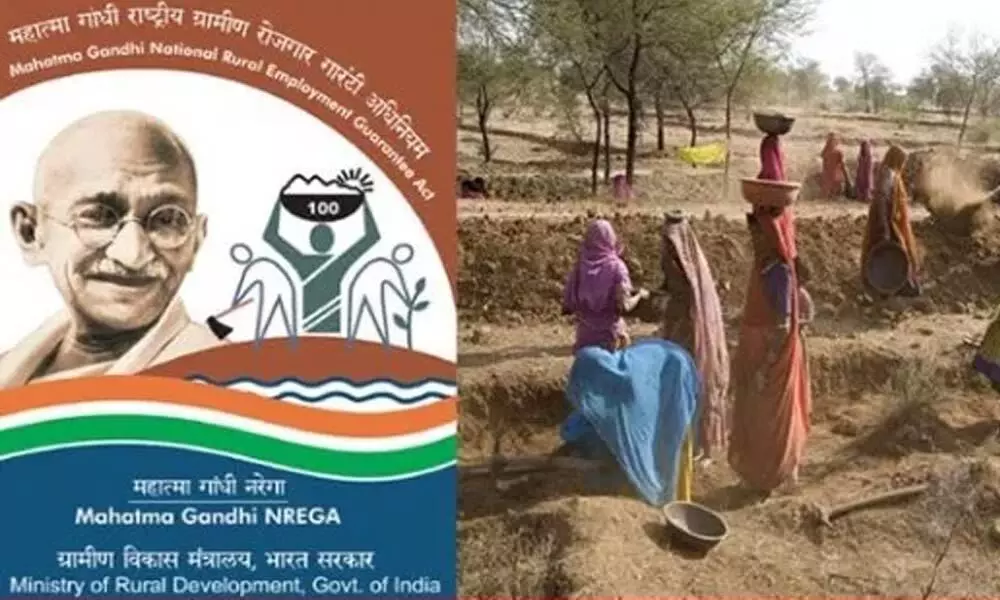India & NDB sign agreement for $1,000 million to provide support to Aatma Nirbhar Bharat Abhiyan through MGNREG Scheme
Union Government and the New Development Bank (NDB) on Wednesday, December 16, 2020, signed a loan agreement for lending $1,000 million for ‘supporting India’s economic recovery from COVID-19’. The $1 billion loan from the NDB has a tenor of 30 years, including a 5-year grace period.
image for illustrative purpose

Union Government and the New Development Bank (NDB) on Wednesday, December 16, 2020, signed a loan agreement for lending $1,000 million for 'supporting India's economic recovery from COVID-19'. The $1 billion loan from the NDB has a tenor of 30 years, including a 5-year grace period.
The loan will support expenditures on rural infrastructure related to natural resource management (NRM) and rural employment generation under Government of India's Mahatma Gandhi National Rural Employment Guarantee Scheme (MGNREGS).
Ministry of Finance in a tweet today said, "Government of India and NDB sign agreement for $1,000 million to provide support to #AatmaNirbharBharat Abhiyan through MGNREG Scheme to support India's economic recovery from #COVID19."
Government of India and NDB sign agreement for $1,000 million to provide support to #AatmaNirbharBharat Abhiyan through MGNREG Scheme to support India's economic recovery from #COVID19
— Ministry of Finance (@FinMinIndia) December 16, 2020
Read more ➡️ https://t.co/3ZMvG4NpxF@nsitharamanoffc@Anurag_Office@PIB_India @DDNewslive
The country-wide restriction on movement of people, coupled with additional stringent restrictions imposed by State Governments and intermittent localized lockdowns to contain the spread of COVID-19, affected domestic supply and demand, resulting in slowed down economic activity. This resulted in a loss of employment and income of workers especially those employed in the informal sector, including rural areas.
The programme will support the government in mitigating the adverse economic impact of COVID-19 pandemic and enable economic recovery in rural areas through:
Natural resource management works which will facilitate economic activity.
Employment generation to stimulate rural demand, to combat the decline in economic activity due to the outbreak of COVID-19.
Creation of durable Rural Infrastructure Assets
The program seeks the creation of durable rural infrastructure assets related to NRM and generate employment opportunities for rural poor, especially the migrant workers who have returned to their homes from urban areas, which led to a loss of their livelihoods due to COVID-19 pandemic.
The agreement was signed by Baldeo Purushartha, Joint Secretary, Department of Economic Affairs, Ministry of Finance, on behalf of the Government of India and Mr. Xian Zhu, Vice President, Chief Operations Officer on behalf of the NDB.
Mr Purushartha said, "The programme will improve the livelihood of rural poor along with providing income opportunities to migrant workers who have returned from urban areas because of job loss caused by COVID-19 pandemic." He further added, "NDB's timely assistance will help the Government in combating the economic disruptions caused by COVID-19 pandemic and creating employment opportunities in rural areas to stimulate demand."
Mr. Xian Zhu said, "The programme will support the Government of India's efforts in mitigating the adverse economic impact of COVID-19 pandemic and enable economic recovery in the rural areas through NRM works and employment generation." He added, "The funding under NDB's Policy on fast-track emergency response to COVID-19 will help preserve rural income and sustain rural expenditure, resulting in increased demand that aids economic recovery."
New Development Bank (NDB)
The NDB was established based on the Inter-Governmental agreement among the BRICS countries (Brazil, the Russian Federation, India, China and South Africa) signed on July 15, 2014. The purpose of the Bank is to mobilise resources for infrastructure and sustainable development projects in BRICS and other emerging market economies and developing countries.

